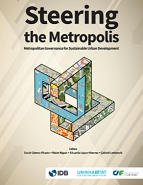Steering the Metropolis: Metropolitan Governance for Sustainable Urban Development
Date
Oct 2017
EDITOR
Gómez-Álvarez, David; Rajack, Robin Michael; López-Moreno, Eduardo; Lanfranchi, Gabriel
A distinctive feature of urbanization in the last 50 years is the expansion of urban populations and built development well beyond what was earlier conceived as the city limit, resulting in metropolitan areas. This is challenging the relevance of traditional municipal boundaries, and by extension, traditional governing structures and institutions. "Steering the Metropolis: Metropolitan Governance for Sustainable Urban Development,” encompasses the reflections of thought and practice leaders on the underlying premises for governing metropolitan space, sectoral adaptations of those premises, and dynamic applications in a wide variety of contexts. Those reflections are structured into three sections. Section 1 discusses the conceptual underpinnings of metropolitan governance, analyzing why political, technical, and administrative arrangements at this level of government are needed. Section 2 deepens the discussion by addressing specific sectoral themes of mobility, land use planning, environmental management, and economic production, as well as crosscutting topics of metropolitan governance finance, and monitoring and evaluation. Section 3 tests the concepts and their sectoral adaptations against the practice, with cases from Africa, America, Asia, and Europe.
Generative AI enabled





